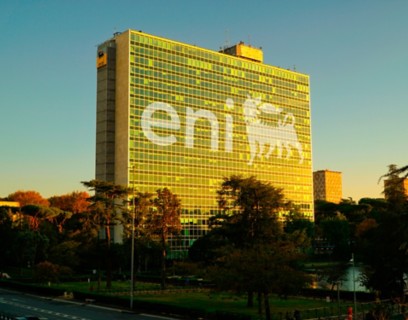Partnerships and advocacy initiatives for carbon neutrality
We engage with institutions, energy players, suppliers, civil society, governments and legislators to combat climate change.

Through partnerships we contribute to supporting the energy transition, by sharing best practices and creating value for the company and stakeholders. At the same time, we promote dialogue with governments, legislators and other companies to shape or support global policies and regulations that incentivise climate change mitigation. We directly engage with governments and legislators and through trade associations or multi-sectoral coalitions.
Partners in the energy industry
Collaborations with other players in the energy sector are a key tool for the energy transition journey. Here are some of our main global partnerships and initiatives in which we participate.
OGMP - Oil & Gas Methane Partnership 2.0
Eni is a founding member of the Oil & Gas Methane Partnership 2.0 (OGMP 2.0), the United Nations Environment Programme (UNEP) for reporting and mitigating methane emissions in the oil and gas sector.
IOGP - International Association of Oil & Gas Producers
Global association of oil and gas exploration and production companies committed to improving safety, sustainability and efficiency in the energy sector.
PACTA - Pact for the Decarbonisation of Air Transport
Initiative promoted together with Aeroporti di Roma, to define a roadmap for the decarbonisation of the air transport sector by 2050.
OGDC - Oil & Gas Decarbonisation Charter
Initiative launched at COP28 involving more than 55 national and international O&G companies, with the aim of moving the sector towards transparent and practical measures to reduce emissions, including methane and flaring.
GFMR - Global Flaring and Methane Reduction
World Bank-initiated initiative of governments, oil companies and other organisations committed to eliminating routine gas flaring and reducing methane emissions from the oil & gas sector to near zero by 2030.
OGCI - Oil & Gas Climate Initiative
Voluntary initiative of 12 companies representing over a third of the world's oil and gas production, united in the fight against climate change and the transition of the energy sector to a Net Zero future.
IETA - International Emissions Trading Association
An association that supports the implementation of carbon markets as a tool to reduce GHG emissions and to pursue decarbonization actions in line with the objectives of the United Nations Framework Convention on Climate Change.
IPIECA
The Global Oil and Gas Association for Advancing Environmental and Social Performance across the Energy Transition is the first trade association on environmental and social issues for the O&G industry.
AFID - The Alliance for Industry Decarbonization
Set up by the International Renewable Energy Agency, Siemens Energy and 13 other partners, it aims to decarbonise industrial supply chains in line with the goals of the Paris Agreement.
Suppliers
We have been promoting various initiatives to involve the entire value chain for some time. Learn more about the relations with our suppliers:
- eniSpace: a collaborative platform dedicated to Eni's suppliers where information can be found for those who collaborate or want to collaborate with Eni by sharing common goals and values
- Sustainable Procurement: Eni shares values, commitments and objectives with the supply chain, verifies the ESG positioning of its suppliers and engages them in a sustainable growth journey by providing programmes for the continuous improvement of ESG performance
- Open-es: a unique platform where the sustainability data sharing component is complemented by a particular focus on growth and collaboration between companies, through a simple, flexible and tailor-made approach.
Climate advocacy
We recognise the value of actively participating in the work of business associations to develop and share best practices, as well as to develop advocacy positioning that promotes the energy transition. In 2024, we published the third edition of our report assessing the alignment between Eni's positioning and that of the business associations in which the Company participates on issues related to climate advocacy. With this in mind, Eni is proactively committed to influence each association’s position — particularly those that diverge from the Eni Principles on Climate Advocacy — towards an approach consistent with effectively addressing climate change. Eni’s Climate Advocacy Principles are:
- Paris Agreement: we support the Agreement's objectives and policies that work together to achieve the goals of sustainability, energy security, and the protection of industrial competitiveness on the path to Net Zero by 2050
- role of gas: we recognise the role of natural gas in the energy transition and support the implementation of specific regulations to reduce methane emissions and routine flaring
- carbon pricing: we support the implementation of credible and cost-efficient carbon pricing mechanisms
- energy efficiency and low carbon technologies: we promote activities and policies to support energy efficiency and technologies necessary for decarbonisation such as renewable CCS, Carbon Dioxide Removal and hydrogen
- sustainable mobility: we support the implementation of complementary solutions for decarbonising transport, such as sustainable biofuels and electric mobility, and policies based on a technology-neutral approach that promote the most mature and cost-efficient technologies
- role of carbon credits: we support the development of enabling policies for investments in Nature and Technology Based Solutions and the use of credits to offset hard-to-abate residual emissions
- transparency and disclosure: we support the development of best practices for transparent disclosure of climate actions and climate advocacy.
Renewables and low carbon fuels
February 2024 - Renewable energy – guidance on designating renewables acceleration areas
We support the European Commission’s initiative to provide guidance for acceleration areas (AAs) under the Renewable Energy Directive.
March 2024 - Design elements of renewable energy auctions (guidance)
We support the European Commission’s objective of promoting uniform standards at EU level for renewable energy auctions, in order to build an integrated market and ensure their rapid and widespread adoption. Further harmonisation of auction design principles by Member States could in fact reduce transaction costs and promote healthy competition among developers.
October 2024 – Delegated Act specifying a methodology for assessing greenhouse gas emissions savings from low-carbon fuels
We support the EU’s objective to define clear and stable rules for investors in the hydrogen supply chain and to contribute to the development of the European hydrogen market. We believe that some of the proposed requirements should be proportionate, clear and not entail significant barriers to the implementation of low-carbon hydrogen and low-carbon fuel projects.
November 2024 - Renewable and recycled carbon fuels – extending the scope of traceability of the EU database
Eni supports the continuous improvement of the Union Database as a tool to track transactions of renewable or recycled carbon fuels and the respective raw materials used for their production, from the point of origin of the raw materials to the point where the fuels are placed on the EU market for final consumption.
May 2024 - Food safety – updated rules for imports of used cooking oil (UCO)
We suggest that the Commission should:
- provide further guidance on the requirements necessary for a third country supplier to fall under the definition of “approved or registered establishment or facility in a third country”
- publish a per-country update and a detailed and robust procedure for importing UCOs, including rules, necessary documents, local competent authorities and support agencies in third countries, and make it available to operators and authorities in third countries.
Magnetic confinement fusion
May 2024 - Public Consultation on Euratom Research and Training Programmes 2026-2027
Eni is committed to promoting the industrial development of magnetic confinement fusion as a key technology to achieve decarbonisation objectives. Fusion technology is a key solution to achieve the European goal of zero emissions, perfectly integrating the imperatives of decarbonisation and energy independence.
August 2024 - Call for Evidence: Fusion for Energy joint undertaking – Interim Evaluation
We believe that ITER (International Thermonuclear Experimental Reactor) remains a highly significant project for the development of fusion technology, representing one of the largest and most ambitious international efforts to demonstrate the technical and economic feasibility of fusion. We believe in and work hard to advance fusion energy, demonstrating our dedication to driving innovation in energy technologies and ensuring a sustainable energy future.
EU Emissions Trading System
July 2024 - Emissions trading system (ETS) Monitoring and Reporting Regulation amendment in response to the ETS revision
We propose to align the EU ETS compliance rules with the provisions of the ReFuelEU Aviation Regulation, in particular by suggesting the removal of the “physical constraint” that allows aircraft operators to claim only the sustainable aviation fuels (SAF) allowances physically purchased at the same departure airport for ETS purposes. In the same vein, we propose to remove the “physical constraint” that limits aircraft operators to requesting free allowances only in proportion to eligible aviation fuels purchased at the same departure airport.
December 2024 - Aviation fuels & emissions trading – calculating the price difference between eligible fuels and kerosene (detailed rules)
With regard to the communication of the actual prices paid by aircraft operators for SAFs, we draw attention to the serious risks of breach of confidentiality arising from the proposed calculation for the price of eligible aviation fuels.
August 2023 – Industrial Carbon Management Strategy
We believe that CCS is an essential tool to achieve carbon neutrality in Europe by 2050: a necessary lever in the process of reducing hard-to-abate emissions from the industrial, thermal and electricity sectors. It is also an effective solution to reduce emissions from current hydrogen production and to support the start-up of a clean hydrogen economy.
Climate disclosure standards
August 2022 – EFRAG Draft of European Sustainability Reporting Standards E1 - Climate Change
We support the proposal for a European climate reporting standard and believe that, generally speaking, the requirements proposed by EFRAG are useful to ensure comprehensive reporting on companies' decarbonization strategy. We hope that the most important international standard setters will soon issue clear guidance on the metrics required by the standard whose calculation methodologies are still debated.
July 2022 - International Sustainability Standards Board (ISSB) Exposure Draft S2 on Climate-related Disclosures
We supported the ISSB's draft climate disclosure standard, the requirements of which are based on the 4 key areas for users and preparers already outlined by the TCFD (Governance, Risk Management, Strategy and Targets & Metrics). It complements these minimum cross-sectoral requirements with a sectoral disclosure to capture the specific needs of different sectors. We would like the sectoral requirements to be developed further, including by comparison with specific, recognized and widely adopted standards (e.g. for the O&G sector, the IPIECA/API/IOGP standard). Based on this draft, the ISSB published the IFRS S2 Climate-related Disclosures in June 2023.
June 2022 – US SEC Proposed rule for the Enhancement and Standardization of Climate-Related Disclosures for Investors
In its response letter to the SEC, Eni supported the Commission's decision to develop a mandatory climate disclosure standard for companies, including a GHG Scope 1, 2 and 3 emissions reporting requirement. While developing this standard, Eni suggested that the Commission build on existing guidelines on the matter, such as the TCFD Recommendations, and work towards convergence between this standard and those being developed by other major international regulators (e.g. EFRAG, ISSB).
Carbon Removal
May 2022 - Certification of carbon removals – EU rules
We welcome and support the European Commission's initiative on the certification of carbon removal solutions. We believe that harmonising the rules on the certification of all types of carbon removal activities at a European level will increase the confidence of private actors in the development of such solutions, with the environmental and social benefits of their implementation being clear. This will also facilitate decision-making and encourage investment in this market.
Reducing methane emissions
April 2022 - New rules to prevent methane leakage in the energy sector
We support the proposal for an EU-wide law to cut methane emissions, with the aim of achieving climate neutrality by 2050. In this regard, we share the European Commission's goal of improving the accuracy of source information and reducing methane emissions. We also suggest improving the proposed regulation, taking into account that the requirements should balance the rate of emissions and the associated likelihood of occurrence with the costs for operators to comply with the obligations.
January 2022 - Methane Guiding Principles Signatory Reporting
Through its participation in the Methane Guiding Principles initiative, Eni is committed to supporting methane policies and regulations that encourage early action, drive improved performance, facilitate appropriate implementation and support flexibility and innovation. In a subset of the Methane Guiding Principles initiative, detailed recommendations were developed to support appropriate European Union (EU) legislation to achieve ambitious methane emission reduction results across the entire supply chain of natural gas consumed in the EU.
2024 activities
Renewables and low carbon fuels
February 2024 - Renewable energy – guidance on designating renewables acceleration areas
We support the European Commission’s initiative to provide guidance for acceleration areas (AAs) under the Renewable Energy Directive.
March 2024 - Design elements of renewable energy auctions (guidance)
We support the European Commission’s objective of promoting uniform standards at EU level for renewable energy auctions, in order to build an integrated market and ensure their rapid and widespread adoption. Further harmonisation of auction design principles by Member States could in fact reduce transaction costs and promote healthy competition among developers.
October 2024 – Delegated Act specifying a methodology for assessing greenhouse gas emissions savings from low-carbon fuels
We support the EU’s objective to define clear and stable rules for investors in the hydrogen supply chain and to contribute to the development of the European hydrogen market. We believe that some of the proposed requirements should be proportionate, clear and not entail significant barriers to the implementation of low-carbon hydrogen and low-carbon fuel projects.
November 2024 - Renewable and recycled carbon fuels – extending the scope of traceability of the EU database
Eni supports the continuous improvement of the Union Database as a tool to track transactions of renewable or recycled carbon fuels and the respective raw materials used for their production, from the point of origin of the raw materials to the point where the fuels are placed on the EU market for final consumption.
May 2024 - Food safety – updated rules for imports of used cooking oil (UCO)
We suggest that the Commission should:
- provide further guidance on the requirements necessary for a third country supplier to fall under the definition of “approved or registered establishment or facility in a third country”
- publish a per-country update and a detailed and robust procedure for importing UCOs, including rules, necessary documents, local competent authorities and support agencies in third countries, and make it available to operators and authorities in third countries.
Magnetic confinement fusion
May 2024 - Public Consultation on Euratom Research and Training Programmes 2026-2027
Eni is committed to promoting the industrial development of magnetic confinement fusion as a key technology to achieve decarbonisation objectives. Fusion technology is a key solution to achieve the European goal of zero emissions, perfectly integrating the imperatives of decarbonisation and energy independence.
August 2024 - Call for Evidence: Fusion for Energy joint undertaking – Interim Evaluation
We believe that ITER (International Thermonuclear Experimental Reactor) remains a highly significant project for the development of fusion technology, representing one of the largest and most ambitious international efforts to demonstrate the technical and economic feasibility of fusion. We believe in and work hard to advance fusion energy, demonstrating our dedication to driving innovation in energy technologies and ensuring a sustainable energy future.
EU Emissions Trading System
July 2024 - Emissions trading system (ETS) Monitoring and Reporting Regulation amendment in response to the ETS revision
We propose to align the EU ETS compliance rules with the provisions of the ReFuelEU Aviation Regulation, in particular by suggesting the removal of the “physical constraint” that allows aircraft operators to claim only the sustainable aviation fuels (SAF) allowances physically purchased at the same departure airport for ETS purposes. In the same vein, we propose to remove the “physical constraint” that limits aircraft operators to requesting free allowances only in proportion to eligible aviation fuels purchased at the same departure airport.
December 2024 - Aviation fuels & emissions trading – calculating the price difference between eligible fuels and kerosene (detailed rules)
With regard to the communication of the actual prices paid by aircraft operators for SAFs, we draw attention to the serious risks of breach of confidentiality arising from the proposed calculation for the price of eligible aviation fuels.
2023 activities
August 2023 – Industrial Carbon Management Strategy
We believe that CCS is an essential tool to achieve carbon neutrality in Europe by 2050: a necessary lever in the process of reducing hard-to-abate emissions from the industrial, thermal and electricity sectors. It is also an effective solution to reduce emissions from current hydrogen production and to support the start-up of a clean hydrogen economy.
2022 activities
Climate disclosure standards
August 2022 – EFRAG Draft of European Sustainability Reporting Standards E1 - Climate Change
We support the proposal for a European climate reporting standard and believe that, generally speaking, the requirements proposed by EFRAG are useful to ensure comprehensive reporting on companies' decarbonization strategy. We hope that the most important international standard setters will soon issue clear guidance on the metrics required by the standard whose calculation methodologies are still debated.
July 2022 - International Sustainability Standards Board (ISSB) Exposure Draft S2 on Climate-related Disclosures
We supported the ISSB's draft climate disclosure standard, the requirements of which are based on the 4 key areas for users and preparers already outlined by the TCFD (Governance, Risk Management, Strategy and Targets & Metrics). It complements these minimum cross-sectoral requirements with a sectoral disclosure to capture the specific needs of different sectors. We would like the sectoral requirements to be developed further, including by comparison with specific, recognized and widely adopted standards (e.g. for the O&G sector, the IPIECA/API/IOGP standard). Based on this draft, the ISSB published the IFRS S2 Climate-related Disclosures in June 2023.
June 2022 – US SEC Proposed rule for the Enhancement and Standardization of Climate-Related Disclosures for Investors
In its response letter to the SEC, Eni supported the Commission's decision to develop a mandatory climate disclosure standard for companies, including a GHG Scope 1, 2 and 3 emissions reporting requirement. While developing this standard, Eni suggested that the Commission build on existing guidelines on the matter, such as the TCFD Recommendations, and work towards convergence between this standard and those being developed by other major international regulators (e.g. EFRAG, ISSB).
Carbon Removal
May 2022 - Certification of carbon removals – EU rules
We welcome and support the European Commission's initiative on the certification of carbon removal solutions. We believe that harmonising the rules on the certification of all types of carbon removal activities at a European level will increase the confidence of private actors in the development of such solutions, with the environmental and social benefits of their implementation being clear. This will also facilitate decision-making and encourage investment in this market.
Reducing methane emissions
April 2022 - New rules to prevent methane leakage in the energy sector
We support the proposal for an EU-wide law to cut methane emissions, with the aim of achieving climate neutrality by 2050. In this regard, we share the European Commission's goal of improving the accuracy of source information and reducing methane emissions. We also suggest improving the proposed regulation, taking into account that the requirements should balance the rate of emissions and the associated likelihood of occurrence with the costs for operators to comply with the obligations.
January 2022 - Methane Guiding Principles Signatory Reporting
Through its participation in the Methane Guiding Principles initiative, Eni is committed to supporting methane policies and regulations that encourage early action, drive improved performance, facilitate appropriate implementation and support flexibility and innovation. In a subset of the Methane Guiding Principles initiative, detailed recommendations were developed to support appropriate European Union (EU) legislation to achieve ambitious methane emission reduction results across the entire supply chain of natural gas consumed in the EU.
The Net Zero target: a shared commitment
To achieve carbon neutrality by 2050, we are leveraging dialogue, partnerships and cutting-edge solutions.
Eni for 2024. Check out our interactive feature
Read the stories, case studies and testimonials behind our contribution to a socially equitable energy transition in the Sustainability Report.





















